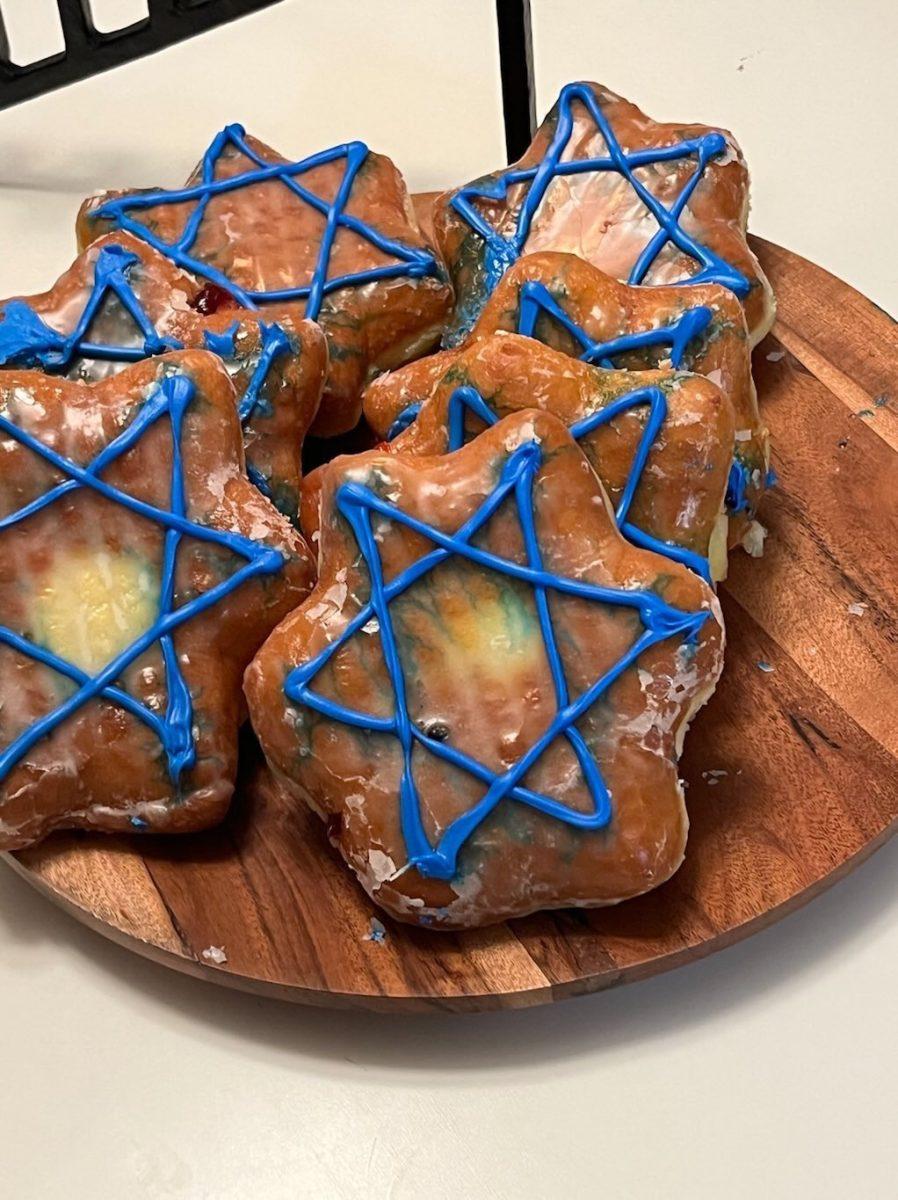Christian supremacy runs rampant during the holiday season, especially in the United States (U.S.). It’s common for folks to wish each other “Merry Christmas” in passing after fall festivities and holidays like Thanksgiving, rather than acknowledge all the holidays the winter season brings. Although roughly 85% of Americans celebrate Christmas, why should we disregard the other 15%? The U.S.’s current population is 331.9 million citizens, 15% of that number is nearly 50 million people, almost the entire population of South Korea.
Prejudice against non-Christians has been on the rise since the early 2000’s, and has increased significantly since the attacks on Sept. 11, 2001. This is proven daily, however, it becomes more widely acknowledged during the holiday seasons. Recently there has been a push to use the phrase “Happy Holidays” because it’s inclusive of anyone who celebrates anything during the winter months; referring to late November, December, and January.
Imagine someone wishing you “Happy Birthday!” every single day, when it’s not even close to your birthday. Annoying, right? This strenuous routine of correcting is the reality for many non-Christian and non-religious folks every winter. Why would you wish someone a happy birthday if you’re not sure if it’s their birthday, let alone a holiday you’re not sure they celebrate?
In Western culture, the most popular holiday of the year is Christmas; a Christian holiday celebrating the birth of Jesus Christ on Dec. 25. It is traditionally celebrated with food, gift giving, and red and green decorations that usually include small pine trees covered in ornaments and lights; it also features walls adorned with stockings and banisters with garlands. There is a non-religious celebration of Christmas, including more focus on the legend of Santa Claus; Santa comes to your house on Christmas Eve night, delivering gifts to children who had good behavior. While Christmas can be fun for those who celebrate it, there are many other winter holidays that deserve just as much recognition. Here’s a quick rundown of other holidays that are also celebrated during the winter season.
Chanukah, or Hanukkah, is the Jewish celebration of light that lasts eight days and nights. Chanukah occurs between late November and December; relying on when the 25th day of Kislev, the third month of the civil year and the ninth month of the ecclesiastical year, in the Hebrew calendar falls. Also known as the Festival of Lights, Chanukah commemorates the recovery of Jerusalem from the Seleucid Empire in the 2nd century BCE. The translation for the name of this holiday from Hebrew to English is tricky. Working with the English alphabet, Chanukah, haa·nuh·kuh, would be closer to the original Hebrew word. “I love lighting the Menorah with my family — my family also eats jelly filled doughnuts,” said Esmée Andersson-Halli, a Jewish student at Franklin. “This holiday is […] about celebrating rather than gift giving and receiving, though gifts are a part of it too.”
The celebration of winter holidays is unique to everyone. Different families have different traditions and customs, which is one of the most beautiful aspects of the holiday season. Jayden Morales, a Mexican Portland Community College student, celebrates a mix of holidays during winter. “Our holidays include both Hanukkah and Christmas. We celebrate both because it means a lot to us [my family] and the people we celebrate both holidays with,” they said. “My mother is Jewish from her father’s side and isn’t active in Judaism, but celebrates [Hanukkah] in remembrance [of] her Jewish father,” Jayden continued.
Kwanzaa is a celebration of African-American culture, occurring from Dec. 26 to Jan. 1. Celebrations include fresh fruit, decorations, traditional clothing, music, and more. Colorful African cloth, called kente, is commonly seen worn by respected elders. Women and children are treasured during this time; children are traditionally in ceremonies to pay respects to elders, while women wear traditional clothing called kaftans. This holiday is also a celebration of light, but mainly refers to the Nguzo Saba (The Seven Principles) of African heritage. The Kinara, similar to the Menorah, is a seven-branched candle holder lit in households where Kwanzaa is celebrated. The seven branches represent the Nguzo Saba.
Around the same week of Christmas, Yule takes place on the winter solstice. This usually falls on Dec. 21 or Dec. 22, depending on the year. Yule welcomes the sun’s rebirth, as winter solstice is the shortest day of the year. The celebration of Yule includes burning a Yule log, symbolizing the warmth and light of the sun returning. This holiday is commonly recognized as a Pagan holiday, but it’s mainly part of Germanic culture; it is celebrated in Northern European countries and parts of Scandinavia.
Dec. 13 is St. Lucia’s, or St. Lucy’s day, a celebration of light and giving. Though this holiday is Scandinavian, there are Christian and Pagan elements to it. “It used to be a Christian tradition, but now it’s less about the religious aspect, and more about welcoming light,” said Piper Powell, a Swedish Franklin student. St. Lucia, the religious figure for the holiday, is most commonly recognized with a crown of candles feeding saffron rolls to the poor. In Sweden, children celebrate by participating in a Lucia train: a parade of singing with one selected girl at the front representing St. Lucia. “My family celebrates at home by making saffron rolls, listening to St. Lucia’s day music, and thinking about and appreciating what brings light into our lives,” shared Powell. Similar to other holidays of light, St. Lucia’s day is important to note because it highlights the separation of Scandinavian customs from other European cultures.
In southern Asia, one of the most prominent holidays is Diwali; the Hindu festival of lights that lasts over five days, and celebrates the victory of good over evil. Hindu children take a liking to this holiday for its mass amounts of fireworks and candy. In Hinduism, the religious goal of the festival is to always keep your decisions aligned with the Dharma, meaning duty or order. The date of this holiday varies, usually taking place late October or early November; this year’s Diwali festival took place on Nov. 12. This holiday is observed by many different religions in southern Asia. Religious and ethnic groups, like Jains, Sikhs, Buddhists, and more, have their own interpretations and customs to the Diwali festival.
After reading about other winter holidays, some of the Christian community and other affiliations would argue that saying “Happy Holidays!” takes away from their Christmas. This community often includes white, older people trying to keep their “traditions.” I have seen this argument happen first hand from my experience in customer service. They often have the same defensive claims; it’s always something along the lines of “Well what about us?!” This take, in itself, is incredibly selfish. What about the millions, if not billions, of folks who are underrepresented; the folks who have to constantly show up and speak up for themselves because of bigotry? The ideology that places non-white and non-religious holidays as less important than the more popular, white, Christian holidays, like Christmas, has a rich xenophobic theme. Time and time again we see this continuous defensiveness when oftentimes the overall concept that’s being defended is rooted in colonialism and white supremacy. It’s important to dismantle these systems once and for all, which is why even a greeting like “Happy Holidays!” can be so important. It’s little steps like these that will help to dismantle the systems that oppress others who don’t assimilate to what we consider our “mainstream and accepted culture.”
This is why it’s crucial to understand the importance of recognizing minorities during the holiday season, and in day to day life. With a rise of xenophobia in the United States, it’s more important than ever to pay attention to the language we use this holiday season. The 15% of Americans that don’t celebrate a traditional Christmas need visibility and empathy. “Although I haven’t had [any] backlash trying to advocate for more visibility of [Hanukkah], I have had a few anti-semetic comments,” shared Andersson-Halli. If you are unable to advocate for marginalized communities in a social-political way, it doesn’t hurt to be inclusive this holiday season. It’s as simple as saying “Happy Holidays.”

































